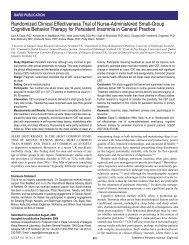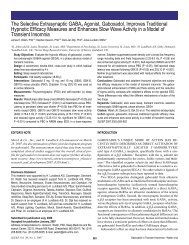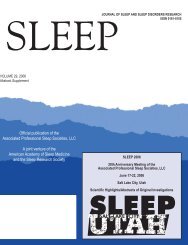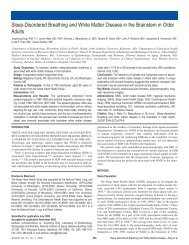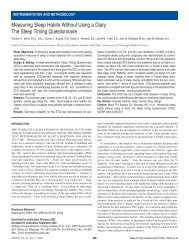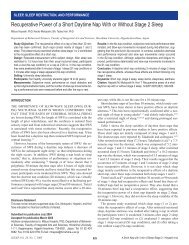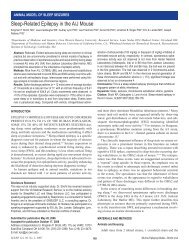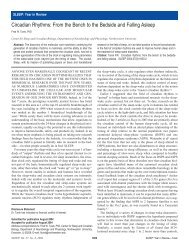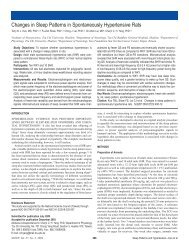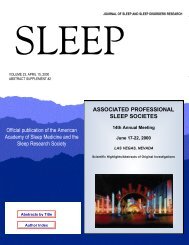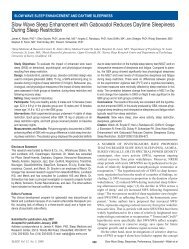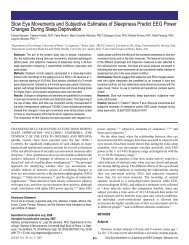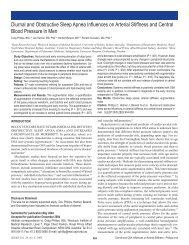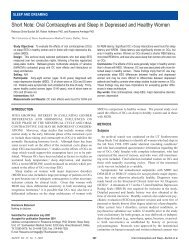SLEEP 2011 Abstract Supplement
SLEEP 2011 Abstract Supplement
SLEEP 2011 Abstract Supplement
Create successful ePaper yourself
Turn your PDF publications into a flip-book with our unique Google optimized e-Paper software.
A. Basic Science VIII. Behavior<br />
0194<br />
NAPPING, GPA AND MORNINGNESS-EVENINGNESS IN<br />
UNDERGRADUATE STUDENTS<br />
Walsh CM 1 , McNair T 1 , Culnan E 1 , Hildenbrand A 1 , Sexton-Radek K 2 ,<br />
Kloss JD 1<br />
1<br />
Psychology, Drexel University, Philadelphia, PA, USA, 2 Psychology,<br />
Elmhurst College, Elmhurst, IL, USA<br />
Introduction: College students are notorious for irregular sleep habits,<br />
including more evening chronotypes, disturbed sleep, and poor quantity.<br />
Sleep quantity and academic performance are significantly related,<br />
with less sleep associated with lower grade point average (GPA). Napping<br />
has been shown to improve performance; however, its prevalence<br />
among undergraduates and relation to GPA and chronotype is not wellestablished.<br />
The study aimed to compare GPA, chronotype, and napping<br />
habits among undergraduates during the Winter and Spring quarters<br />
(January-May 2010).<br />
Methods: Participants included 78 undergraduates (ages 18-30) at<br />
Drexel University who were part of a larger study examining the impact<br />
of sleep education on sleep knowledge, habits and other variables.<br />
Based on mean nap length, participants were divided into 2 groups,<br />
where “good” nappers napped for an average of ≤30 minutes and “poor”<br />
napped for > 30. There were 24 good nappers (N= 11 males) and 54 poor<br />
nappers (N= 14 males). The Morningness-Eveningness Questionnaire<br />
(MEQ) assessed chronotype; nap frequency & duration were calculated<br />
from a daily sleep diary over an average of 2 weeks. GPA was extracted<br />
from transcripts. Group differences were assessed using independent t-<br />
tests.<br />
Results: Nearly 81% of the sample took at least one nap, with 69.2%<br />
napping for an average of >30 minutes (M=57.58 ± 50.00). No significant<br />
differences existed between good & poor nappers on GPA; however,<br />
one emerged on MEQ scores for poor nappers (M=43.15 ± 7.26)<br />
versus good nappers (M=45.83 ± 10.70); t(76)= -1.296, p=0.02. Poor<br />
nappers had lower MEQ scores, indicating greater propensity towards<br />
eveningness. Interestingly, no relationship was found between GPA and<br />
napping.<br />
Conclusion: Most of the sample reported both taking naps and napping<br />
for longer than typically recommended to experience health benefits<br />
(>30 minutes). Those whose naps averaged >30 minutes reported<br />
a tendency toward eveningness, perhaps supporting a circadian phase<br />
delay. One hypothesis is that students with evening preference who need<br />
to wake up early may compensate by extending nap duration. This may<br />
permeate a vicious cycle between napping & delaying bedtimes as homeostatic<br />
pressure is attenuated at a typical bedtime due to extended<br />
naps. While we did not find an association between napping, DSPS, &<br />
GPA, future studies may more closely examine student sleep patterns,<br />
napping habits, and chronotype with academic performance and daytime<br />
functioning.<br />
0195<br />
<strong>SLEEP</strong> HABITS AND INSOMNIA SYMPTOMS IN COLLEGE<br />
STUDENTS<br />
Rutigliano JV 1 , Mindell JA 1,2 , DuMond C 2,3<br />
1<br />
Saint Joseph’s University, Philadelphia, PA, USA, 2 Children’s Hospital<br />
of Philadelphia, Philadelphia, PA, USA, 3 University of Pennsylvania<br />
School of Medicine, Philadelphia, PA, USA<br />
Results: On weekdays, participants slept an average of 6.60 hours<br />
(SD=1.28), and on weekends 7.90 hours (SD=1.50). The average weekday<br />
bedtime was 12:39 A.M and the average wake time was 8:10 A.M.<br />
On weekends, the average bedtime was 2:31 A.M and the average wake<br />
time was 10:56 A.M. Alcohol consumption was associated with bedtimes,<br />
wake times, night wakings, sleep latency on weekends, being late<br />
or missing class, and GPA (r=.14 to .47, p 5).<br />
Conclusion: Sleepiness may substantially impair ability to benefit from<br />
a lecture. This exploratory study suggests that sleepiness among college<br />
students is unmasked by lectures and consistently reaches a peak about<br />
30 min into a lecture.<br />
Introduction: Sleep problems are prevalent in college students, and can<br />
interfere with functioning. Few studies have examined sleep habits, and<br />
insomnia symptoms in college students. The purpose of this study was to<br />
ascertain typical sleep habits and the prevalence of insomnia symptoms<br />
in university students.<br />
Methods: A survey was administered to 245 undergraduate students (71<br />
males and 173 females) at a small university. 86.10% of participants<br />
were Caucasian, 6.10% were African American, and 7.80% were other.<br />
0197<br />
IMPROVING ACCURACY OF <strong>SLEEP</strong> SELF-REPORTS USING<br />
A BEHAVIOR ANALYTIC APPROACH<br />
Montgomery-Downs HE, St. Peter Pipkin C, Massullo J<br />
Psychology, West Virginia University, Morgantown, WV, USA<br />
Introduction: Behavior analysts’ relative lack of attention to sleep<br />
may be due, in part, to inaccuracy of self-report. Improving self-report<br />
accuracy would allow researchers and clinicians to assess field-based<br />
<strong>SLEEP</strong>, Volume 34, <strong>Abstract</strong> <strong>Supplement</strong>, <strong>2011</strong><br />
A70



